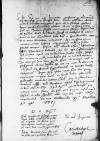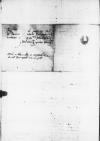Letter #682
Cornelis DE SCHEPPER to Ioannes DANTISCUSWallendorf, 1531-09-11
English register:
De Schepper has accomplished the mission for which he had set out from Brussels for the Ardennes. He sends this letter through a messenger who is departing. He will leave for Brussels the same day and hopes to arrive there within 10 days. If there is urgent news, Dantiscus should send it through Johann Baptista von Taxis. De Schepper wrote to [Alfonso de] Valdés in order to recommend his case to [Nicolas Perrenot de] Granvelle. He also asks for the support of Dantiscus. He has no news from the deserted region where they are staying. Thanks to the Margrave of Baden [Bernhard III], who acts as the representative of the Emperor [Charles V], they have plenty of game to eat, but De Schepper prefers simple lamb or pork in the company of Dantiscus.
In the cities, the plague is spreading violently; in a few rural areas the air is so lethal that it can be compared to lake Avernus. Panic arose in Luxembourg because of the same omens as observed in Brussels. De Schepper prays that Christ protect them both from imminent danger. He sends greetings to the Margrave [Johann Albrecht of Brandenburg-Ansbach] and other friends. Dantiscus should urge the Prince-Bishop of Liège [Erard de la Marck] to support De Schepper's request in front of the Emperor.
In an ironical postscript the Viscount (vicecomes) who accompanies De Schepper sends his greetings to Dantiscus. He would like to trade part of their venison for Dantiscus' wine. He jokes about their huge stock of salt.
| received Brussels, [1531]-09-12 Manuscript sources:
Prints:
| ||||||||||||||
Text & apparatus & commentary Plain text Text & commentary Text & apparatus
Reverendissimo in Ch paper damaged⌈[in Ch]in Ch paper damaged⌉risto Patri et Domino, domino
Salutem plurimam.
Ex quo abii
Ill(ustri) or Ill(ustrissimo)⌈Ill(ustri)Ill(ustri) or Ill(ustrissimo)⌉
Ex vico
Dominationis Vestrae Reverendissimae ex animo inservitor
Postscript:
Dominus vicecomes collega meus bezat vobis manus et pedes et cuperet, ut ferinae, quam


 AAWO, AB, D. 3, f. 52v
AAWO, AB, D. 3, f. 52v